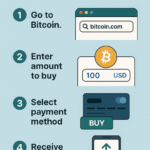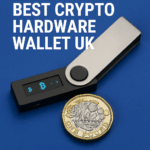Hello, cryptomaniacs! In this article, we are going to talk about Ethereum. If you have been around the block a few times with trading digital currencies or if this is your first time testing the waters, there’s a good chance that you have at least heard of Ethereum. But what is it exactly?
Well, strap yourselves in because we are about to take off on a wild ride through space where will dive deep into what makes this one of the most revolutionary technologies of our generation.
What is Ethereum?
Ethereum is popularly described as a digital city that never sleeps because of its continuous innovation and activity. Primarily, it is a platform without a central authority where smart contracts and decentralized applications (DApps) can be built and executed by developers. Ethereum stands out from the rest because of its multi-functionality and flexibility.
It is not only about exchanging digital currency but also transforming whole sectors through changing how we transact, communicate and collaborate on the Internet. There are no limits with Ethereum; individuals can come up with decentralized finance (DeFi) protocols or create non-fungible tokens (NFTs) among others such as decentralized autonomous organizations (DAOs). It is an exciting environment full of imagination where different ideas fuse towards the future of finance and technology.
How does Ethereum work?
To maintain platform integrity and functionality, Ethereum works on a decentralized network made up of nodes. Ethereum is built on blockchain technology which is a distributed ledger for recording transactions across computer networks. Nevertheless, what makes Ethereum unique is that it can run smart contracts; these are self-executing agreements whose terms are directly written in code.
These smart contracts utilize Ether (ETH), the native cryptocurrency of Ethereum, and they allow developers to create various decentralized applications (DApps) on the platform.
Whenever someone initiates a transaction or smart contract on Ethereum, it gets sent out to the network where miners race against each other to validate and include it into the blockchain through the mining process. Such a consensus algorithm guarantees the security as well as the immutability of Ethereum thereby making it reliable for decentralized finance, gaming, NFTs etcetera.
How do you buy Ethereum?
There are many places where you can buy Ethereum, so getting it is not very difficult. Typically this is done through a variety of platforms and methods that are all pretty simple. The most common way to get Ethereum is on cryptocurrency exchanges. All you have to do is create an account with them and deposit your money (fiat currency such as US dollars or euros) then use that to buy ether.
Most of these exchanges also offer an interface that makes it easy for anyone who wants to navigate around there and make a purchase. Peer-to-peer platforms exist as well; they allow individuals to buy ethers directly from each other using different payment methods like bank transfers or PayPal.
Another option available would be using cryptocurrency ATMs which enable one to exchange cash for Ether straightaway. But no matter what method someone decides upon, it’s important they pick reputable platforms while taking necessary security measures to protect their investments properly.
Top Exchange Where You Can Buy Ethereum
There are many exchanges for you to buy Ethereum such as:
Coinbase is globally recognized as one of the biggest and most popular cryptocurrency exchanges. Its user-friendly interface and strong security measures are among the reasons why it is well-known.
Binance: Another leading exchange that offers various cryptocurrencies including Ethereum is Binance which serves both beginners and experienced traders.
Kraken boasts a wide selection of cryptocurrencies along with its robust security features making it a trusted platform for buying, selling, or trading ethereum as well as other coins.
Gate– With its established reputation for reliability as well as an extensive list of altcoins available for trade – Gate could be considered among the top exchanges in terms of volume handled per day too; they have been around since 2014!
Gemini-Regulated by the New York State Department of Financial Services (NYSDFS), Gemini was founded by Tyler and Cameron Winklevoss offering secure platforms for buying/selling etheruem and other cryptos
Is Ethereum safe?
As with any technology, there are risks and considerations associated with Ethereum, but it is generally safe if used responsibly. The security of the Ethereum blockchain itself is well-known because of its decentralization and consensus mechanisms that ensure immutability. However, how safe Ethereum can be largely depends on what people do with it as well as some other factors they may take into account while using it. Some examples of risk include smart contract vulnerabilities; exchange or wallet hacking attempts; regulatory uncertainties etcetera.
To reduce these risks one should follow good security habits including using trusted wallets, activating two-factor authentication and keeping private keys secure among others. It is also important to stay updated about what’s happening around the larger environment of Ethereum and adhere to universally recommended approaches so that users can interact with this platform without fear.
Who runs Ethereum?
Decentralization is the main principle of Ethereum. It means that no one controls it. A worldwide community of developers, miners and users supports the system.
The Ethereum Foundation is a non-profit organization which was instrumental in the early growth and adoption of the platform, but it doesn’t have power over the network. Different parties make decisions concerning Ethereum’s future such as upgrades or modifications through consensus among members within its community as well as other stakeholders who may be involved in this process.
This decentralized approach guarantees that nobody can manipulate Ethereum fostering openness while making it more robust while enabling creative solutions to flourish within such an environment.
How does Ethereum have value?
Ethereum is important because it has value. These digital applications are like an operating system called DApps, which do all kinds of things such as finance and gaming but in a safe and fast way. To ensure that everything runs smoothly and fairly, these applications use the technology of Ethereum.
Ether (ETH) is also there — this is Ethereum’s own currency used for transactions and running these apps. Being one of the best platforms for such things with constant improvements, people trust it and want to invest into it thus making its currency valuable too. Therefore, usefulness popularity trustworthiness within the digital technology sphere worldwide constitute value of Ethereum.
What are smart contracts?
Smart contracts are contracts that can be executed on their own because they contain the agreement’s terms in the code itself. They work on the Ethereum blockchain, so they are distributed and performed by computers running Ethereum nodes over a network.
Trustless and transparent transactions are possible thanks to smart contracts which perform actions automatically whenever pre-set conditions are met without intermediaries being involved.
For instance, one may use a smart contract to ensure funds transfer upon satisfaction of particular requirements such as specific dates or achievements of goals.
DApps (decentralized applications) rely heavily on smart contracts which serve as building blocks for decentralized finance (DeFi), and supply chain management systems among others like voting mechanisms powered by Ethereum technology.
Top Ethereum Features
Below are the top ethereum features which make ethereum special
- Smart Contracts: With Ethereum, you can create smart contracts that operate on their own when certain conditions are met. These are computer programs which automatically execute actions; for instance, they send money to somebody once he/she has finished some job.
- Decentralized Applications (DApps): Unlike being just a currency, Ethereum functions as a base where decentralized apps can be built. Decentralized applications run on networks of computers rather than single servers – this makes them censorship-resistant and more secure.
- Ether (ETH): The cryptocurrency unique to Ethereum is known as Ether or ETH in short forms; it is also used for paying services rendered within the Ethereum eco-system besides transaction charges levied on the network itself. Additionally, like any other stock or foreign exchange trading pairings, one can trade Ethereum against other cryptocurrencies through various exchanges too.
- Immutable Blockchain: A digital ledger designed for recording all transactions and smart contracts with no possible alterations or deletions ever after they have been saved into blocks – that’s what an immutable blockchain does best! So this technology ensures safe transparent ethereum transactions.
- Innovation without Limits: Is an ever-changing system which continuously gets updated and upgraded to fasten its speed while making it sustainable enough not only for developers but also for miners who power these processes using electricity.
- Governance by Community: All key decisions concerning the future development direction taken by ethereum are made collectively among stakeholders such as developers themselves along with miners plus users thus preventing any centralization attempts over ethereum space.
These characteristics enable Ethereum be used widely in creating distributed apps securely executing financial deals through blockchains while at the same time promoting invention within realms of cryptosystems
How To Store Ethereum?
To guard your investment, it is crucial to store Ethereum securely. Here is a step-by-step guide in easy way:
- Select a Wallet: First, pick out a wallet for storing Ethereum. There are various kinds of wallets – software (like mobile or desktop apps), hardware (physical devices), and paper (printed QR codes). Choose the one that suits you best by considering security and ease of use.
- Download/Purchase Wallet: In case you choose software wallets, download this wallet application from trusted sources like official websites or app stores. However, if you prefer hardware wallets, buy these devices at reputable retailers.
- Configure Your Wallet: To set up your wallet, follow the instructions given by the provider. Normally this means creating strong passwords/PINs and securing phrases for recovery. Keep the phrase safe because it will be required to regain entry into your account in case password amnesia occurs or device loss happens.
- Receive Ethereum: Once established; an exclusive Ethereum address gets assigned to each user through their wallets’ systems; this becomes their digital bank account number for receiving ethers shared between individuals via peer-to-peer networks such as blockchain technology.
- Send Ethereum: Go to the send/transfer section on your wallet app if you wish sending some Ether from there into another person’s account who also owns one supported by different platforms built around smart contracts etcetera like Solidity which can take advantage of EVM compatibility layer where many programming languages work together seamlessly thanks to compilers like Truffle Suite besides other tools such as MetaMask plugin enabling developers interact with DApps no matter which browser they’re using currently among others still coming up day by day till now 2027 has seen over 10 million lines added every month since its beginning back in 2015.
- Backup Wallet Regularly: Always backup regularly any crypto-wallet just so that should anything happen say phone gets lost or damaged for instance then all coins/tokens will be safe because can restore them onto new devices.
- Keep Updated: Update wallet software / device firmware so that it has access to latest features plus security improvements while checking often enough but not too much otherwise you could end up wasting time when everything is already fine according provider suggestions about how best keep safe whatever wealth represented by digital assets like Ethereum kept within respective wallets themselves only accessible through software installed locally on personal computers with internet connection enabled at times otherwise offline transactions using hardware wallets protected by PIN codes affording highest levels of security possible provided such devices were not tampered with during manufacturing process followed afterwards until handed over buyer whomsoever that might be either individual or company depending upon which jurisdiction involved here -By adhering these points, one can safely keep their ethers and rest easy knowing that they are secure.
Few Best Wallets To Store Ethereum?
Here are a few of the finest wallets for Ethereum storage:
- MetaMask: MetaMask is a well-known wallet in the form of a browser extension that lets users manage Ethereum and ERC-20 tokens straight from their web browsers. It has an intuitive interface and enables token swaps and decentralized application (DApp) integration among other functionalities.
- Ledger Nano S/X: Ledger Nano S and Ledger Nano X are hardware wallets that deliver maximum security for storing offline Ethereum as well as other cryptocurrencies like Litecoin or Bitcoin Cash. These can be used for long-term storage since they come with strong encryption features and multi-currency support.
- Trezor: Trezor is another type of hardware wallet which boasts high levels of safety along with ease-of-use properties while supporting not only Ether itself but also many alternative coins such as Ripple (XRP). This allows people to keep their digital assets away from hackers’ reach by keeping them stored offline securely.
- MyEtherWallet (MEW): MyEtherWallet is one popular online online-client-side interface used mainly for creating and managing secure ethereum wallets easily; it provides features like token support, and offline transaction signing among others, additionally integrates even further with hardware wallets thus offering an added layer of protection against threats posed by malware attacks when compared against pure software wallets .
- Coinbase Wallet: Coinbase Wallet happens to be mobile friendly allowing individuals store safely different types digital currencies including ethereum on their smartphones; it offers multi-coin support, DEX access among others dapps capabilities meaning you have more control over what coins should be supported within this system rather than being limited only by those offered by app developers themselves .
- Trust Wallet: Trust Wallet was created owned by Binance supports many different cryptos such as ether; it works well across various devices thanks largely in part due its simple user interface design coupled together with built-in DEX support among other features which allow cross-chain compatibility between different digital asset types via Binance Smart Chain (BSC).
How To Transfer & Receive Ethereum?
Certainly, this is a step-by-step guide to transferring and receiving Ethereum:
How to transfer Ethereum:
- Access your wallet: Log in with your credentials or unlock your hardware wallet if you are using one.
- Find the send option: Look for “send” or “transfer” within the wallet interface. It’s usually located on the main dashboard or in the navigation menu.
- Enter recipient address: Copy and paste or type in the correct ethereum address of the person you’re sending to. Always double-check as transactions on the blockchain are irreversible.
- Specify amount: Determine how much ethereum you want to send out and key it in. Some wallets allow users to choose between different denominations such as ETH/Wei – make sure you select the right one and consider transaction fees too!
- Set gas fee: For an ethereum transaction to be processed by miners, it needs gas fees attached. Depending on network congestion & transaction urgency, set appropriate gas fee higher fees means faster confirmation times)
- Review transaction details: Ensure all information provided is accurate before confirming anything! Check recipient address, transfer amount & gas fee etc., mistakes could be costly.
- Confirm Transaction: Once everything looks good click send; some wallets may ask for password/PIN/other authentication depending on what security measures you have enabled
- Monitor transaction: You can track progress either through your wallet itself or a blockchain explorer – transactions take a few minutes generally but times may vary based upon activity levels of networks
How to receive Ethereum:
- Give them your ETH address so they know where to send it! In most wallets this is found under ‘Receive’ or ‘Wallets’.
- Either copy (CTRL+C) then paste (CTRL+V) OR scan/share via email/messaging apps/QR code whichever method works best for both parties involved
- Optional – sometimes QR codes are available for easy sharing, if so display one and let them scan it
- Once the sender has initiated a transfer that includes your ethereum address, you can monitor incoming transactions from within your wallet; they are visible on the blockchain so this lets you verify them
- After the transaction is confirmed check the balance to ensure successful receipt usually balances update automatically but might need refreshment.
Best Ethereum Alternatives
Many blockchain platforms offer alternatives to Ethereum, each with its own unique features and use cases. Here are some of the best Ethereum alternatives:
- Binance Smart Chain (BSC): Binance Smart Chain is known for its high throughput and low transaction fees compared to Ethereum. It supports smart contracts and decentralized applications (DApps) and is compatible with the Ethereum Virtual Machine (EVM), making it easy for developers to port over their Ethereum-based projects.
- Cardano (ADA): Cardano is a blockchain platform that focuses on scalability, interoperability, and sustainability. Its goal is to provide a secure and scalable infrastructure for building decentralized applications (dApps) and smart contracts.
- Solana (SOL): Being a high-performance blockchain platform designed for decentralized applications and crypto projects, Solana boasts fast transaction speeds as well as low fees given its nature which makes it great especially when it comes down to those applications where large numbers of transactions need fast processing time without having high latency requirements at all.
- Polygon (MATIC): Formerly known as Matic Network, Polygon serves as an official layer 2 scaling solution for Ethereum that leverages the power of multiple sidechains in order to address the scalability issues of the latter one as such by offering framework one can build upon while connecting various networks which are compatible with this particular type so far based on what has been said about it before now right here today itself.
- Polkadot (DOT): Polkadot allows different blockchains to share information and transactions through an interoperable multi-chain platform thus enabling a variety of use cases including decentralized finance gaming supply chain management among others thereby fostering cross communication between these chains themselves which would otherwise not happen were this system absent or lacking altogether which might lead into many problems later but fortunately we have something like that anyway so why not make good use outta them right now huh sounds good doesn’t it just go along with everything said up until this point okay then.
- Tezos (XTZ): Tezos is a blockchain platform that emphasizes governance, security, and formal verification. It enables stakeholders to vote on proposed protocol upgrades and changes thus ensuring the network remains secure and up-to-date always so there’s no need for any other similar systems out there because this one does everything needed from such kind of things hence why bother yourself with others if you already have what you need right in front of eyesight all time anyway?
Final Verdict
To sum up, Ethereum is a pioneering development in blockchain technology which provides a decentralized environment for executing smart contracts and building DApps.
It is valuable and important in the digital economy due to its unique aspects like Ether (ETH) being a native cryptocurrency, smart contracts and an active community of developers. The flexibility of Ethereum has made it find applications in various industries such as decentralized finance (DeFi), gaming and non-fungible tokens (NFTs).
With ongoing protocol improvements and community-driven governance that ensures its robustness even in the face of changing landscapes within blockchain technologies; this shows that Ethereum can keep growing regardless of challenges or risks. While pushing the limits of innovations, Ethereum remains the leader among other platforms by transforming how we transact with each other over the internet.









